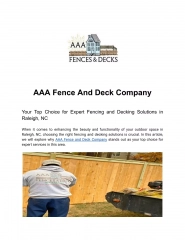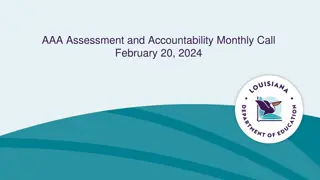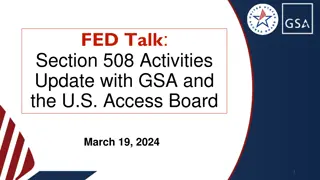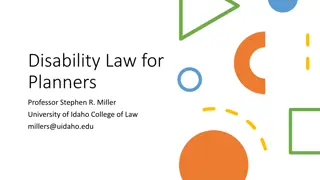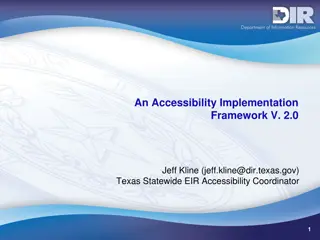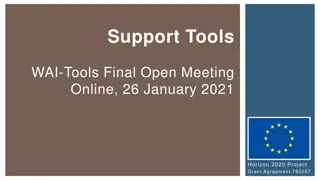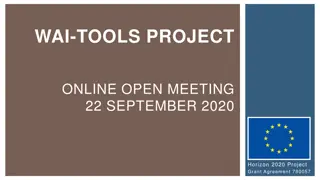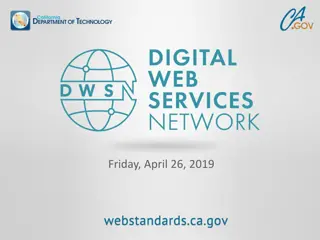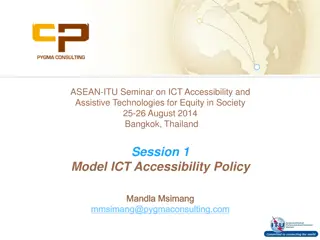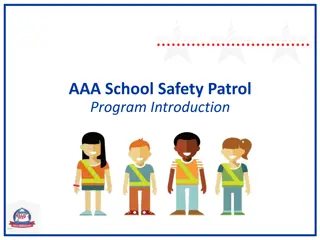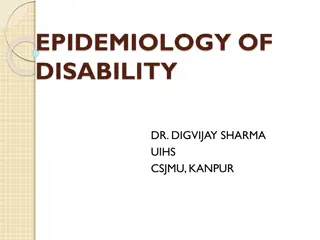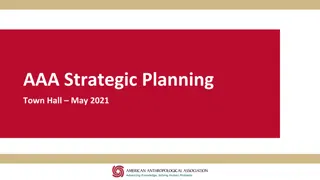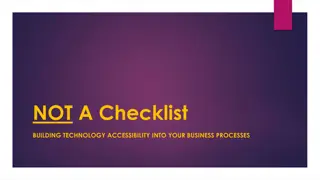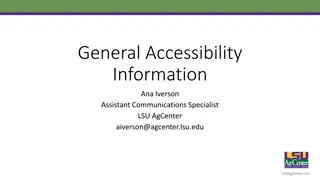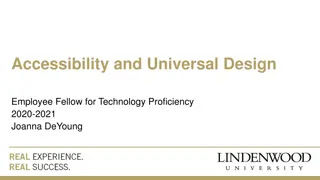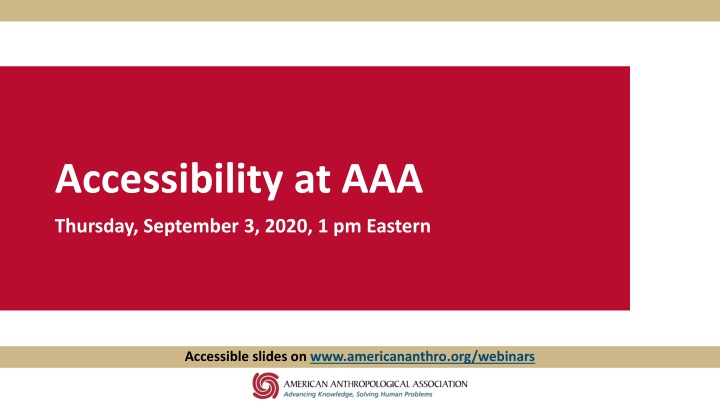
Accessibility & Disability Basics - What Is AAA Doing?
Today's discussion includes topics such as language regarding disability and accessibility, types of disabilities and access, the commitment to accessibility, accommodations, and access needs. Learn about the history of accessibility at AAA and what actions AAA is taking in this regard. Join Nell, CPACC, the Accessibility & Meetings Coordinator for the AAA, for an informative session. Accessible slides are available on the American Anthropological Association's webinars page.
Download Presentation

Please find below an Image/Link to download the presentation.
The content on the website is provided AS IS for your information and personal use only. It may not be sold, licensed, or shared on other websites without obtaining consent from the author. If you encounter any issues during the download, it is possible that the publisher has removed the file from their server.
You are allowed to download the files provided on this website for personal or commercial use, subject to the condition that they are used lawfully. All files are the property of their respective owners.
The content on the website is provided AS IS for your information and personal use only. It may not be sold, licensed, or shared on other websites without obtaining consent from the author.
E N D
Presentation Transcript
Accessibility at AAA Thursday, September 3, 2020, 1 pm Eastern Accessible slides on www.americananthro.org/webinars
Accessible Introduction Name: Nell, CPACC Pronouns: she/her/hers Visual description: A white woman with short black hair wearing a headset, thin-rimmed glasses, and a white button-up shirt with a tan virtual background with the AAA logo. Position and institution: Accessibility & Meetings Coordinator for the AAA Accessible slides on www.americananthro.org/webinars
Access Notes Accessible slides available on www.americananthro.org/webinars ASL interpretation is provided and will be prioritized during screen share. Professional CART captioning is available by switching on Facebook closed captions. Please ask questions and share comments during the live stream. We will respond to them following the slides presentation. A recording of this livestream will be available on the AAA YouTube channel following the event by the end of next week.
What are we talking about today? 15 minutes: 1. Accessibility & Disability Basics 2. A Brief History of Accessibility at AAA 3. What is AAA Doing? 10 minutes: 4. Questions? Accessible slides on www.americananthro.org/webinars
Accessibility & Disability Basics Language about Disability & Accessibility Types of Disabilities & Access Accessible slides on www.americananthro.org/webinars
Language about Disability & Accessibility Disabled people (identity-first) AND people with disabilities (person-first) are both used by different members of the disability community Accessibility the commitment to an environment being initially designed so that the greatest number of people can participate without needing to later alter the space to meet individual needs Accommodations individualized changes made to an environment after the initial design of a space upon a person s request to meet their needs Access needs an individual s environmental, behavioral, physical, attitudinal, and other needs as related to accessibility and accommodations Accessible slides on www.americananthro.org/webinars
Types of Disabilities & Access Examples of disability categories D/deaf & hard-of-hearing Blind & low vision Mobility impairments Psychiatric disabilities & mental illness Autism spectrum Intellectual & developmental disabilities (IDD) Chronic illness & chronic pain & chronic fatigue Learning disabilities Sometimes they overlap! People can have multiple disabilities. Examples of types of access Physical Sensory Mental Emotional Cognitive Linguistic It isn t just about the physical space! Accessible slides on www.americananthro.org/webinars
A Brief History of Accessibility at AAA Accessible slides on www.americananthro.org/webinars
Early Disability Advocacy 1992-1995: Commission on Disability developed and presented a report on improving accessibility services at the Annual Meeting 2006: Disability Research Interest Group (DRIG) of Society of Medical Anthropology sent a letter to the Executive Board regarding meeting standards and outlining demands Accessible slides on www.americananthro.org/webinars
Recent Disability Advocacy 2014-2015: Disability Access Working Group (DAWG) was formed by Karen Nakamura and Rayna Rapp, DRIG members who joined the Executive Board Developed a full report regarding accessibility and disability in the anthropology profession with recommendations for AAA Ordered an independent audit of the Annual Meeting 2016 and on: DRIG Accessibility Advocacy Committee worked with Executive Board and staff to address accessibility and disability issues Accessible slides on www.americananthro.org/webinars
The Last Two Years 2018: Partnered with The Kyle Duarte Company for interpreting & captioning at Annual Meeting DRIG collaborated with AAA Director of Meetings, Nate Wambold, to develop Accessibility & Meetings Coordinator position 2019: First Accessibility & Meetings Coordinator hired Accessible slides on www.americananthro.org/webinars
What is AAA Doing? Accessible slides on www.americananthro.org/webinars
Initiating Cultural Change in Anthropology Supporting disability culture People with disabilities have forged a group identity. We share a common history of oppression and a common bond of resilience. Most importantly, we are proud of ourselves as people with disabilities. We claim our disabilities with pride as part of our identity. We are who we are: we are people with disabilities. (Brown, 2002) Encouraging collective access [F]lexibility and creative nuance that go beyond able-bodied/minded normativity, to be in community with each other. (Sins Invalid, 2015) Learn more about one application of collective access in Dr. Aimi Hamraie s piece, Designing Collective Access: A Feminist Disability Theory of Universal Design . Accessible slides on www.americananthro.org/webinars
Initiating Cultural Change in Anthropology (continued) Going beyond ADA compliance to create a more accessible anthropology discipline Working with staff to build accessibility & accommodation protocols in all AAA projects Collaborating with and learning from Disabled, Deaf, Blind, Autistic, Neurodivergent, Mentally Ill, Chronically Ill, and other disability- adjacent community members Accessible slides on www.americananthro.org/webinars
AAAs Accessibility Education & Outreach Developing and distributing resources for people to learn how to create more accessible presentations, events, documents, resources, materials, etc. Guiding and supporting AAA speakers in generating accessible presentations #AccessibleAnthro On social media via Twitter, Instagram, Facebook, and LinkedIn Through Anthropology News Through Weekend Reads Accessible slides on www.americananthro.org/webinars
How Were Making AAA More Accessible At in-person meetings developing a clear accommodations protocol, providing ASL interpreters and CART captioning for plenary events, establishing a scent-free meeting space, identifying prayer and quiet rooms, designating all-gender restrooms, & providing accessibility tools, such as yoga mats, ear plugs, stim tools At webinars and virtual events training presenters in accessibility, providing CART captioning, inquiring about access needs & fulfilling accommodations requests In our publications and communications including alt text and image descriptions Accessible slides on www.americananthro.org/webinars
Accessibility is more than legal compliance, an ongoing and changing effort, potentially challenging, a community effort, which leads to cultural change, and necessary for a more just and equitable AAA, anthropological discipline, and world. Accessible slides on www.americananthro.org/webinars
Questions? Learn more about accessibility on our accessibility webpage at www.americananthro.org/accessibility! Accessible slides on www.americananthro.org/webinars

